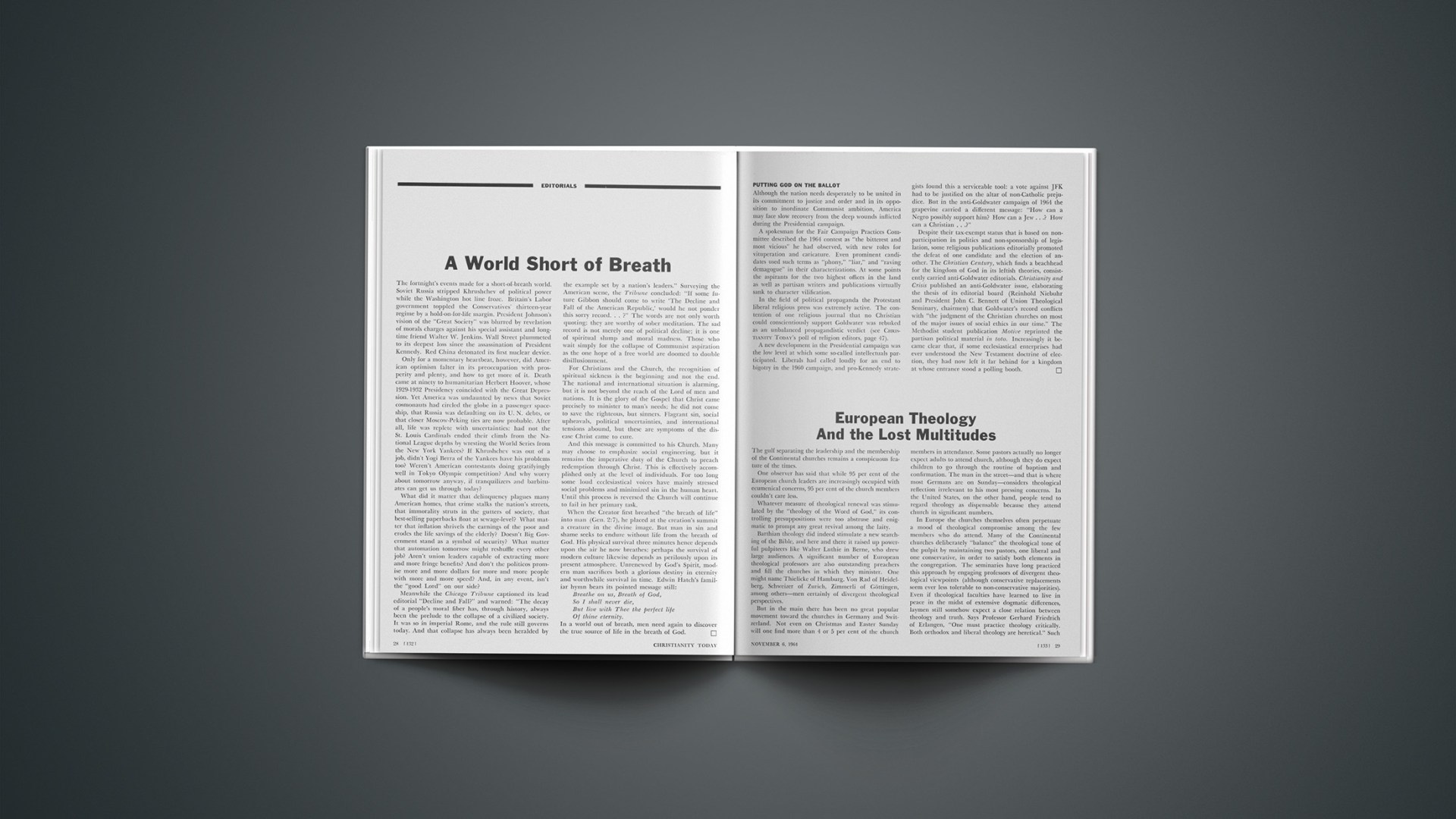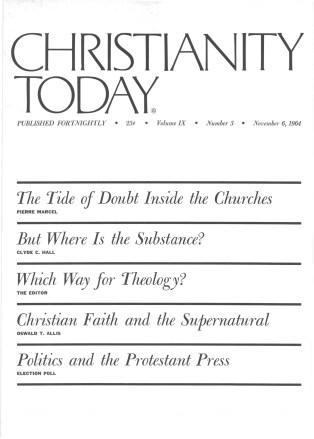The fortnight’s events made for a short-of-breath world. Soviet Russia stripped Khrushchev of political power while the Washington hot line froze. Britain’s Labor government toppled the Conservatives’ thirteen-year regime by a hold-on-for-life margin. President Johnson’s vision of the “Great Society” was blurred by revelation of morals charges against his special assistant and long-time friend Walter W. Jenkins. Wall Street plummeted to its deepest loss since the assassination of President Kennedy. Red China detonated its first nuclear device.
Only for a momentary heartbeat, however, did American optimism falter in its preoccupation with prosperity and plenty, and how to get more of it. Death came at ninety to humanitarian Herbert Hoover, whose 1929–1932 Presidency coincided with the Great Depression. Yet America was undaunted by news that Soviet cosmonauts had circled the globe in a passenger spaceship, that Russia was defaulting on its U. N. debts, or that closer Moscow-Peking ties are now probable. After all, life was replete with uncertainties: had not the St. Louis Cardinals ended their climb from the National League depths by wresting the World Series from the New York Yankees? If Khrushchev was out of a job, didn’t Yogi Berra of the Yankees have his problems too? Weren’t American contestants doing gratifyingly well in Tokyo Olympic competition? And why worry about tomorrow anyway, if tranquilizers and barbituates can get us through today?
What did it matter that delinquency plagues many American homes, that crime stalks the nation’s streets, that immorality struts in the gutters of society, that best-selling paperbacks float at sewage-level? What matter that inflation shrivels the earnings of the poor and erodes the life savings of the elderly? Doesn’t Big Government stand as a symbol of security? What matter that automation tomorrow might reshuffle every other job? Aren’t union leaders capable of extracting more and more fringe benefits? And don’t the politicos promise more and more dollars for more and more people with more and more speed? And, in any event, isn’t the “good Lord” on our side?
Meanwhile the Chicago Tribune captioned its lead editorial “Decline and Fall?” and warned: “The decay of a people’s moral fiber has, through history, always been the prelude to the collapse of a civilized society. It was so in imperial Rome, and the rule still governs today. And that collapse has always been heralded by the example set by a nation’s leaders.” Surveying the American scene, the Tribune concluded: “If some future Gibbon should come to write ‘The Decline and Fall of the American Republic,’ would he not ponder this sorry record …?” The words are not only worth quoting; they are worthy of sober meditation. The sad record is not merely one of political decline; it is one of spiritual slump and moral madness. Those who wait simply for the collapse of Communist aspiration as the one hope of a free world are doomed to double disillusionment.
For Christians and the Church, the recognition of spiritual sickness is the beginning and not the end. The national and international situation is alarming, but it is not beyond the reach of the Lord of men and nations. It is the glory of the Gospel that Christ came precisely to minister to man’s needs; he did not come to save the righteous, but sinners. Flagrant sin, social upheavals, political uncertainties, and international tensions abound, but these are symptoms of the disease Christ came to cure.
And this message is committed to his Church. Many may choose to emphasize social engineering, but it remains the imperative duty of the Church to preach redemption through Christ. This is effectively accomplished only at the level of individuals. For too long some loud ecclesiastical voices have mainly stressed social problems and minimized sin in the human heart. Until this process is reversed the Church will continue to fail in her primary task.
When the Creator first breathed “the breath of life” into man (Gen. 2:7), he placed at the creation’s summit a creature in the divine image. But man in sin and shame seeks to endure without life from the breath of God. His physical survival three minutes hence depends upon the air he now breathes; perhaps the survival of modern culture likewise depends as perilously upon its present atmosphere. Unrenewed by God’s Spirit, modern man sacrifices both a glorious destiny in eternity and worthwhile survival in time. Edwin Hatch’s familiar hymn bears its pointed message still:
Breathe on us, Breath of God,
So I shall never die,
But live with Thee the perfect life
Of thine eternity.
In a world out of breath, men need again to discover the true source of life in the breath of God.
Putting God On The Ballot
Although the nation needs desperately to be united in its commitment to justice and order and in its opposition to inordinate Communist ambition, America may face slow recovery from the deep wounds inflicted during the Presidential campaign.
A spokesman for the Fair Campaign Practices Committee described the 1964 contest as “the bitterest and most vicious” he had observed, with new roles for vituperation and caricature. Even prominent candidates used such terms as “phony,” “liar,” and “raving demagogue” in their characterizations. At some points the aspirants for the two highest offices in the land as well as partisan writers and publications virtually sank to character vilification.
In the field of political propaganda the Protestant liberal religious press was extremely active. The contention of one religious journal that no Christian could conscientiously support Goldwater was rebuked as an unbalanced propagandists verdict (see CHRISTIANITY TODAY’S poll of religion editors, page 47).
A new development in the Presidential campaign was the low level at which some so-called intellectuals participated. Liberals had called loudly for an end to bigotry in the 1960 campaign, and pro-Kennecly strategists found this a serviceable tool: a vote against JFK had to be justified on the altar of non-Catholic prejudice. But in the anti-Goldwater campaign of 1964 the grapevine carried a different message: “How can a Negro possibly support him? How can a Jew …? How can a Christian …?”
Despite their tax-exempt status that is based on nonparticipation in politics and non-sponsorship of legislation, some religious publications editorially promoted the defeat of one candidate and the election of another. The Christian Century, which finds a beachhead for the kingdom of God in its leftish theories, consistently carried anti-Goldwater editorials. Christianity and Crisis published an anti-Goldwater issue, elaborating the thesis of its editorial board (Reinhold Niebuhr and President John C. Bennett of Union Theological Seminary, chairmen) that Goldwater’s record conflicts with “the judgment of the Christian churches on most of the major issues of social ethics in our time.” The Methodist student publication Motive reprinted the partisan political material in toto. Increasingly it became clear that, if some ecclesiastical enterprises had ever understood the New Testament doctrine of election, they had now left it far behind for a kingdom at whose entrance stood a polling booth.










